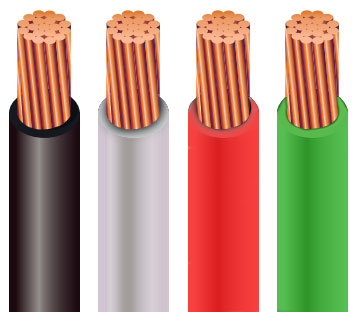
PV wire, or Photovoltaic wire, is a type of electrical wire specifically designed for solar power systems. Made from stranded copper or aluminum conductors, PV wire is insulated with a durable material such as cross-linked polyethylene (XLPE), making it highly resistant to heat, UV radiation, and moisture. It is used to connect solar panels, ensuring that the electrical energy generated by the panels is safely transmitted to inverters and storage units.
Applications of PV Wire
PV wire is primarily used in solar photovoltaic systems, both residential and commercial. It is designed to handle the specific environmental conditions that solar installations face, such as prolonged exposure to sunlight, fluctuating temperatures, and moisture. PV wire is often installed in outdoor applications, connecting the solar panels in a solar array to the inverter or electrical grid. It’s also used in rooftop and ground-mounted solar systems.
Advantages of PV Wire
1. Weather Resistance
One of the key advantages of PV wire is its ability to withstand harsh weather conditions. Its durable insulation protects it from UV rays, high temperatures, and water, making it ideal for outdoor solar installations.
2. High Voltage Tolerance
PV wire is designed to handle high voltage levels, making it suitable for use in solar arrays where electricity is generated at high voltages. This ensures safe and efficient transmission of power without compromising the system’s performance.
3. Flexible and Durable
PV wire is flexible and easy to install, even in challenging environments. Its robust insulation makes it highly durable, reducing the risk of damage or degradation over time.
4. UL and NEC Compliance
PV wire meets UL (Underwriters Laboratories) standards and complies with the National Electrical Code (NEC) requirements for solar installations. This ensures safety and reliability in solar system wiring.
Disadvantages of PV Wire
1. Cost
One of the main disadvantages of PV wire is its cost. It tends to be more expensive than other electrical wires due to its specialized design and high-performance insulation. The cost can add up in larger solar installations.
2. Installation Restrictions
PV wire is generally used for solar applications, so its use outside of these systems may be limited. Additionally, proper installation techniques are required to ensure the wire performs as intended in outdoor environments.
Conclusion
PV wire is essential for solar power systems due to its durability, high voltage tolerance, and weather-resistant properties. While it offers numerous advantages such as flexibility, safety, and long-lasting performance, it also comes with higher costs compared to standard electrical wiring. For those investing in solar power, however, the reliability and efficiency of PV wire make it an ideal choice for safe and effective energy transmission.

